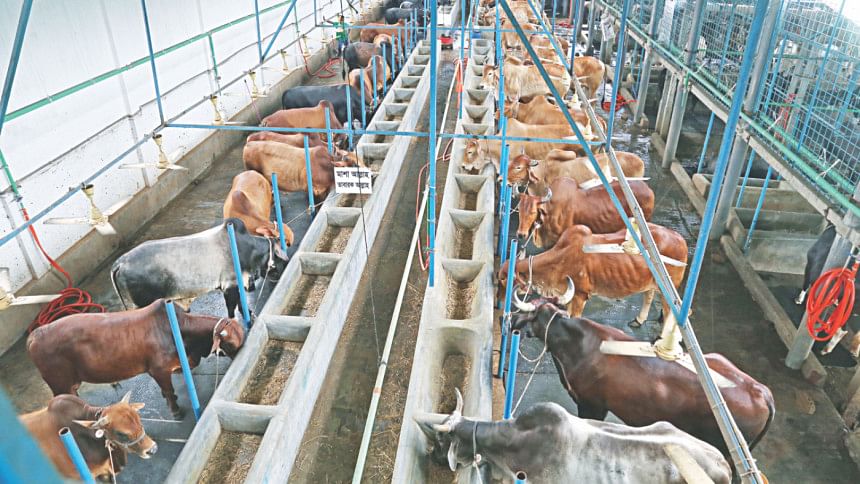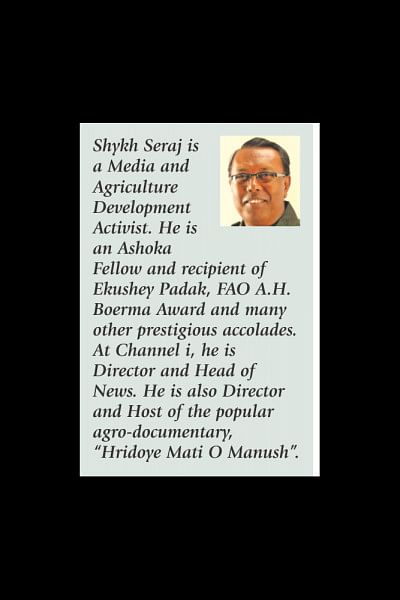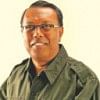Organic beef fattening shows prospect ahead of Eid

Since the independence, people of Bangladesh sought many ways to become self-reliant. And the contribution of rural community behind Bangladesh's turning around has been supreme. As you all know, farming is the backbone of our economy, and as this sector stood on its ground firmly, Bangladesh has established its identity in the world map. The performance of the country in food security is way better than other countries around the world. After the independence, farmers have done tremendously well in paddy and jute cultivation; tried out diverse fruits and crops; fostered cattle and poultry. Most importantly, the youths have greatly contributed to the positive changes in the farming sector. They have spread all across the country with success. Many farmers have become millionaires. Bangladesh is also facing the wind of change of hi-tech farming. I'm sure we'll harvest the best results of the advanced farming very soon.
Dear readers, I would like to share with you the story of mid 80s. During that time, the general farmers of the country used to nurture their cows, feeding them with natural food. These cattle were their wealth, ahead of the Qurbani bazaar. However, as the demand for meat increased tremendously in the country, the concept of beef fattening came along. I featured these changing scenarios on BTV's Mati O Manush. The then head of livestock department of Bangladesh Agricultural University, Dr Saad Ullah brought into the light Urea Molasses Block, a cow feed especially suitable during disasters like flood. This was a brick-shaped solid food, which the cows used to eat by licking. Four to five years later, came Urea Molasses Straw technology (a mixture of water, urea, molasses and straw). This was meant for rapid beef fattening. I would also like to share a funny story regarding the fattening issue. A young boy sent me a letter while I was broadcasting these fattening techniques on BTV's Mati O Manush. He wrote, “If I eat urea, should I get healthier?” I didn't reply to his letter; rather, went straight to his residence in Mirpur to tell his parents that they must be alert about their son so that he doesn't mistakenly do anything hazardous like this. I wanted to draw your attention just to share what some people thought about beef fattening in the country.

According to the Department of Livestock Services (DLS), there are now 5.5 lakh cattle farmers in the country. Altogether, they have 40 lakh cows eligible for sacrifice. The good thing is that consumers are now positively aware about cows' quality. Farmers, consumers and businessmen, all are now aware of the harmful effects of fattening cows by growing them with steroid or other harmful chemicals. In the last few years, driven by the desire to make huge profit, many farmers and businessmen faced great loss as a result of adopting unscrupulous ways. Many consumers can now identify cows which have been fed steroids. Those cows are more calm and quiet. You would notice saliva dripping from some of them continuously. As these characteristics give the message that the cows have been fed steroid, farmers are now more cautious. In the past three years, it was observed that many of the cows that didn't get sold over doubts of having steroid died after a few days. Due to chemicals, the extra water that gets stored in a cow's body turns into poison after a certain period, making it hard for the cow to stay alive. These things are now clear to the farmers concerned. This is a challenging matter to them as they are investing a lot in their farms. They are trying their best to fatten the cows by feeding pure, natural and organic food. Local production of cattle will be sufficient to meet the demand for sacrificial animals in Eid-ul-Azha this year, say livestock department officials.
I went to Gazipur's Konabari a few days back to see Subed Ali Agro Farm where cows are being raised with natural and local feed. There 200 cows are perfectly healthy and good-looking as farmers are cautious about how and what to feed, what are good for digestion etc. The owner of the farm, Haji Monsur Ali is a businessman. He has established this farm with a view to handing over healthy and beautiful cows to the customers on the occasion of Eid-ul-Azha. Monsur also gives 15 to 20 cows to his relatives for Qurbani.
"I have been extremely moved by farming. I also watched your programme on healthy beef fattening which has inspired me to come this far," says Monsur.
Monsur Ali is involved with agriculture for a long time now. This huge farm is on two acres of land. Inside, the works are being done in separate sheds. Under one shed, I saw large cows. Under another, I saw younger ones. Under a different shed, every day foods for these cows are being prepared. Outside, green grass is being produced. Altogether, it is a thoroughly planned cattle farm.
"I not only give them good and healthy feed, but also bathe them with shampoo," says Monsur.
"These cows cost me Tk 2 crore. Along with that, the cost of feed and treatment is there. I expect to make a profit of Tk 40 lakh from this Eid bazaar," says a confident Monsur Ali.
This entrepreneur now spends most of his time in his farm although he has other businesses. He has a lovely bond with every animal in the farm.
The officers of DLS are saying the same thing. Neither is any growth hormone given nor any other unscrupulous method applied. Rather, scientifically approved feed is being provided to these cows. Konabari Sub-Assistant Agriculture Officer (Livestock) Anisul Haque says, sixty percent of the feed is grains, the rest forty is grass, straw and water. DG of Livestock Department, Dr Ainul Haque says, every cattle farmer is listed and under their strict monitoring and suggestions.
Marketing the farm's cows is definitely a challenge. Even the consumers have many doubts regarding beef fattening. Monsur's son Shamim Ahmed, an MBA from UK, is involved in marketing and now looks after his father's farm.
"I'm looking forward to using social media to sell these cows in larger scale," says Shamim.
Dear readers, flood seems to decrease the delight of Eid for half of the people of the nation. Bangladesh, as you know, is geographically a disaster prone country. So the country is always fighting against different natural disasters throughout the year as you definitely are aware of the extreme impacts of climate change, that's changing nature and the fate of people in many negative ways. We have to take measures keeping in mind the disasters that can affect us in future. There should be long term plans to save farming sector. We have to invent new farming technologies which would save our crops, fruits, flora, cattle and fishery, above all, the farmers from disasters. A constructive change is most needed at present. We can't look lightly on the efforts of Monsur Ali and 5.5 lakh farmers like him who rear their cattle through organic beef fattening. If they count loss, the rural economy will be affected, so will be the country's financial system. Keeping Eid-ul-Azha ahead, beef fattening is a great profitable and promising business sector. A large part of unemployment can be eradicated by expanding this sector. Livestock sector can play an important role in the country's economy, I'm sure. Finally, I hope the farmers and people of Bangladesh and South Asian countries recover from the flood losses before the Eid. My heartfelt Eid greetings to all of them.

 For all latest news, follow The Daily Star's Google News channel.
For all latest news, follow The Daily Star's Google News channel. 



Comments